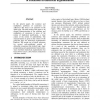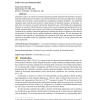83 search results - page 3 / 17 » A logic programming framework for possibilistic argumentatio... |
IBERAMIA
2010
Springer
13 years 4 months ago
2010
Springer
In a recent paper [2] the authors have formalized a recursive semantics for warranted conclusions in a general defeasible argumentation framework based on a propositional logic. Th...
SBIA
1998
Springer
13 years 10 months ago
1998
Springer
Abstract. The ability to view extended logic programs as argumentation systems opens the way for the use of this language in formalizing communication among reasoning computing age...
CORR
2002
Springer
13 years 6 months ago
2002
Springer
In the present paper, the existence and multiplicity problems of extensions are addressed. The focus is on extension of the stable type. The main result of the paper is an elegant...
ICLP
2009
Springer
14 years 7 months ago
2009
Springer
We define logic programs with defaults and argumentation theories, a new framework that unifies most of the earlier proposals for defeasible reasoning in logic programming. We pres...
ICLP
2011
Springer
12 years 10 months ago
2011
Springer
Transaction Logic is an extension of classical logic that gracefully integrates both declarative and procedural knowledge and has proved itself as a powerful formalism for many ad...


